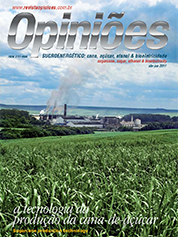Adézio José Marques
President of CEISE Br
Op-AA-28
Self-reformatting the sugarcane-based industry production chain
The world’s ethanol production grew from 16 billion liters in 2000 to more than 100 billion liters last year. Shell, according to The Wall Street Journal, estimates that biofuels may account for up to 20% of all fuels for transportation in 30 years from now, in comparison with 3% today.
In Brazil, more than 80% of new cars sold can run either on ethanol or gasoline, mixed in any proportion, and the biofuel industry already represents 21% of energy sources for transportation, in comparison with 4% in the USA. However, there are huge challenges that need to be understood, measured, assessed and faced. Archer Consulting estimates that Brazil needs new investments in the magnitude of US$ 60 billion in the next six years, just to meet the current demand for dual-fuel cars.
Until 2020, to meet our obligations and keep up supply to our sugar and ethanol markets, we will need at least 100 new mills and will have to duplicate the current planting area required for sugarcane. The Brazilian sectors of machinery, equipment, inputs, capital goods, services and technology also need new investments to meet this demand, not to mention the international market and new agricultural frontiers opening up to agroenergy and biofuels throughout Latin America, Africa and Asian countries.
At the same time, new biofuels appear, which start replacing diesel and aviation kerosene. Investments in ethanol and chemical plants are in a crescendo, as is the sugarcane-based plastics industry. Bioelectricity is striding at a fast pace to take up a distinct position in the energy matrix. In summary, all the fundamentals and prognostics in the agroenergy and biofuels production chain are positive and highly promising.
Even huge investments by international groups and by Petrobras, made in the industry, indicate the high degree of confidence in the future. In fact, though, what is lacking is the regulatory mark, the definition of credit lines, fiscal benefits for greenfield projects and for updating and expanding existing mills.
Another gigantic challenge lies in educating, qualifying and re-qualifying industry’s labor. At the end of 2010, CEISE Br (National Center of Sugarcane-based and Biofuel Industries), in partnership with UNICA (Brazilian Sugarcane Association) and ORPLANA (Sugarcane Planters’ Organization of the Central-Southern Region) launched “Universidade Corporativa do Setor Sucroenergético” - UNICEISE (Corporate University of the Sugarcane-based Industry), an initiative aimed at filling a gap in qualifying managers to perform in companies that comprise the sugarcane-based industry’s production chain.
UNICEISE is an important step towards innovation in the industry, which is in the midst of a transition period, requiring of professionals knowledge in several areas. This involves specialization courses, aimed at meeting technical educational requirements, “MBA” courses, theme-specific courses for managers, and a specific course conceived for directors, vice-presidents and presidents of industry companies.
Another important CEISE Br initiative was to set up Technical Committees (Institutional & Government Relations, Logistics & Transportation, Bioelectricity, Services, Agricultural Machinery and Equipment, Information Technology and Industrial Automation, Foreign Trade, Capital Goods, Inputs and Chemical Products and Technological Innovation) and Industry-related Committees (New Biofuels, Ethanol and Chemicals, Biodiesel and Environmental Sustainability), creating a structure and environment suited for institutionalizing our industry’s Center for Competitive Intelligence, whose main function is to foster the debate about the future of the sugarcane-based industry’s production chain and on biofuels.
As a result of these committees, the realization of several events has been scheduled: “Fórum Nacional dos Setores de Agroenergia, Biocombustíveis e Bioeletricidade”, to take place in “Auditório Nereu Ramos da Câmara Federal”, in Brasília, on the 18th and 19th of August.
This event will debate with at least ten ministers and leaders in the industry, in the unions and with industry-related politicians, aspects concerning economic, social and environmental sustainability.
We believe that multi-sectorial initiatives such as this one show that there is a predisposition for dialogue and understanding, bringing together all interests in this production chain and encouraging the high-level discussion about the main problems and pointing to their solutions. The experience we obtained in more than three decades in developing and producing biofuels, in combination with the urgent need to develop new, clean, safe and renewable energy alternatives, provides us the certainty that we are on the right path.




